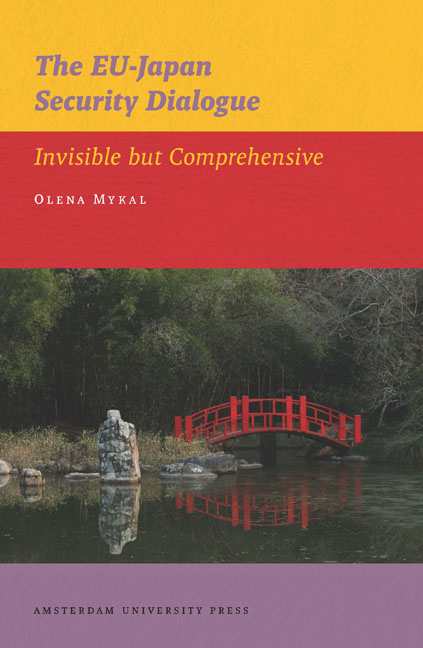Book contents
- Frontmatter
- Dedication
- Contents
- Abbreviations
- Acknowledgements
- Preface
- Introduction
- PART ONE DEVELOPING CONCEPTIONS OF SECURITY AND JOINT AGENDA OF THE EU-JAPAN SECURITY DIALOGUE
- PART TWO COMMON INTERESTS IN THE EU-JAPAN SECURITY DIALOGUE: ANALYSIS OF JOINT ACTIVITIES
- Conclusion
- About the Author
- Notes
- Bibliography
- Index
- Publications Series
2 - The Hague Declaration and Its Implications for the EU-Japan Security Dialogue (1991-2000)
Published online by Cambridge University Press: 22 January 2021
- Frontmatter
- Dedication
- Contents
- Abbreviations
- Acknowledgements
- Preface
- Introduction
- PART ONE DEVELOPING CONCEPTIONS OF SECURITY AND JOINT AGENDA OF THE EU-JAPAN SECURITY DIALOGUE
- PART TWO COMMON INTERESTS IN THE EU-JAPAN SECURITY DIALOGUE: ANALYSIS OF JOINT ACTIVITIES
- Conclusion
- About the Author
- Notes
- Bibliography
- Index
- Publications Series
Summary
In the previous chapter we explored the formation of the security dialogue between the EC and Japan during the Cold War period. This chapter will focus on a discourse analysis of the EU and Japan security dialogue and its development in the 1990s. It argues that during the 1990s the EU-Japan security dialogue continued to develop and expand into new areas. The second argument is that the end of the Cold War led to modifications in the security conceptualisations of the EU and Japan and to the expansion of their security dialogue. Our point can be demonstrated by examining security conceptualisation in Japan in the 1990s. Second, we will study the EU security agenda during the same period. Third, we will establish how the EU-Japan security dialogue evolved throughout this period.
Their bilateral security agenda will be analysed in four sections. The first section traces the origin, significance and implications of The Hague Declaration for the security dialogue. The second section examines the developments in the early 1990s with a special focus on arms register of conventional arms transfers, and the launch of the security dialogue in the area of crisis management. The third section deals with common interests and challenges, and their consequences for the security dialogue. The final section will examine the state of the security dialogue in the late 1990s. It will mostly concentrate on interregional links, arms control and non-proliferation issues as well as the significance of the role of the EU and Japan as ‘equal and respected partners’ in their pursuit of common global interests. Moreover, this section will analyse later developments during the period around the millennium, which have had a direct impact on the evolution of the EU-Japan security dialogue in the first decade of the 21st century.
Issues discussed earlier such as science and technology, the environment, energy, development aid are only touched upon in this chapter, and the concrete development of a security dialogue in those areas will be covered in part two. This structure was used to avoid ambiguity and to keep the focus on the examination of the security dialogue discourse.
- Type
- Chapter
- Information
- The EU-Japan Security DialogueInvisible but Comprehensive, pp. 61 - 94Publisher: Amsterdam University PressPrint publication year: 2012



